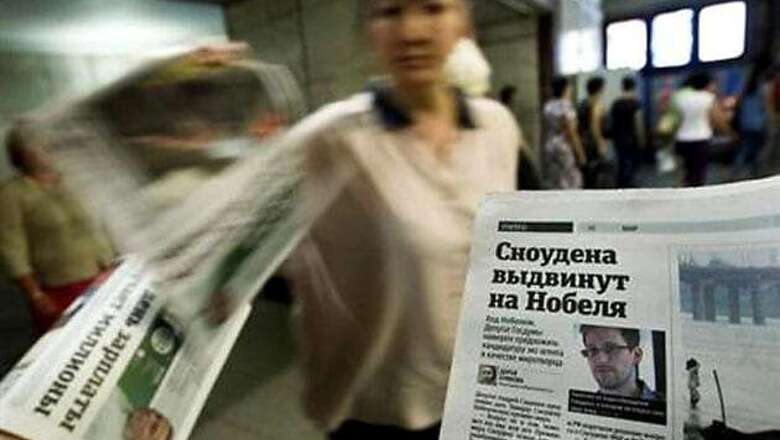
views
Washington: Revelations by former US spy agency contractor Edward Snowden will make it harder for the United States to confront China at talks this week over the alleged cyber theft of trade secrets worth hundreds of billions of dollars each year.
Snowden's disclosures of American electronic surveillance around the world give China an argument to counter US complaints that it steals private intellectual property (IP) from US companies and research centers. Cyber security is at the center of high-level meetings between the two countries in Washington that will show whether a positive tone struck by President Barack Obama and new Chinese President Xi Jinping at a summit last month can translate into cooperation on difficult issues.
Top US officials from Obama down have long tried to convince China to recognise a clear line between the kind of cyber espionage by spy agencies revealed by Snowden and the stealing of technology. "This Snowden thing has muddied the waters in a terrible way," said James McGregor, author of a book on China's authoritarian capitalism and industrial policy.
"China would rather have the waters muddy, because they can say 'You do it. We do it. What's the big deal?' and the cyber theft against companies will go on and on," he said by telephone from China, where he is senior counselor for APCO Worldwide, a US business consultancy.
Treasury Secretary Jack Lew said last week that US officials will press China at the talks on cyber theft, a problem he described as "just different from other kinds of issues in the cyber area." Many countries spy on each other, but US officials say China is unique in the amount of state-sponsored IP theft it carries out as it tries to catch up with the United States in economic power and technological prowess.
Last week the US Department of Justice charged Chinese wind turbine maker Sinovel Wind Group Co (601558.SS) and two of its employees with stealing software source coding from US-based AMSC (AMSC.O) in an alleged theft worth $800 million. The US Chamber of Commerce hopes "to see a clear indication that China recognises thefts of trade secrets, whether by cyber or other means, is stealing property and will bring the full force of its laws to curb this," said Jeremie Waterman, the group's senior director for Greater China.
Beijing regularly parries complaints about Chinese hacking into the computers of US businesses by saying that China is itself a major victim of cyber espionage. Chinese officials have dismissed as unconvincing recent US official and private-sector reports attributing large-scale hacking of American networks to China.
China's official Xinhua news agency last month said the Snowden case showed the United States was "the biggest villain in our age" and a hypocrite for complaining about Chinese cyber attacks. China's stance appears to be bolstered by Snowden's revelations of widespread surveillance by the National Security Agency and his assertion that the agency hacked into critical network infrastructure at universities in China and in Hong Kong.
Snowden first fled to Hong Kong before his leaks to newspapers became public last month, and has subsequently gone to Moscow. He is believed to be holed up in the transit area of the city's Sheremetyevo International Airport and has been trying to find a country that would give him sanctuary.
'OUT OF BOUNDS' SPYING
Now in their fifth year, the annual U.S.-Chinese talks, known as the Strategic and Economic Dialogue, will cover topics from US concerns about North Korea's nuclear weapons and expanding US-China military ties to climate change and access to Chinese financial markets.
China's exchange-rate policy is on the agenda, although it has receded as a issue with the gradual strengthening of the yuan and a reduction of huge current account imbalances. This year Secretary of State John Kerry and Lew host Chinese State Councilor Yang Jiechi and Vice Premier Wang Yang for the first S&ED session since China's once-a-decade leadership change in March when Xi took over.
The meetings follow Obama's summit last month with Xi in California, where the two men developed what aides called a productive relationship. Nevertheless, Obama demanded Chinese action to halt what he called "out of bounds" cyber spying. Civilian and military officials from the two countries discussed international law and practices in cyberspace at low-level talks on Monday. Cyber security is due to come up at other meetings throughout the week that will also likely address US accusations that Beijing gained access electronically to Pentagon weapons designs.
IP theft costs US businesses $320 billion a year, equal to the annual worth of US exports to Asia, authors of a recent report say. A bipartisan group of high-ranking former U.S. officials known as the Commission on the Theft of American Intellectual Property said in a May report that China accounts for between 50 percent and 80 percent of IP theft suffered by US firms.
Cyber theft of industrial designs, business strategies and trade secrets is only a portion of IP pilfering. IP theft more commonly involves "planted employees, bribed employees, employees who were appealed to on the basis of nationalism and all the traditional means of espionage, often accompanied by cyber," said Richard Ellings, president of the National Bureau of Asian Research think tank, who co-wrote the report.
The US District Court in Manhattan charged three New York University researchers in May with conspiring to take bribes from Chinese medical and research outfits for details about NYU research into magnetic resonance imaging technology. Arrests by US Immigration and Customs Enforcement and the Homeland Security Department for IP infringements rose 159 percent and indictments increased 264 percent from 2009-13, according to a report released in June by the US Intellectual Property Enforcement Coordinator.
The Commission on the Theft of American Intellectual Property called for tough penalties including banking sanctions, bans on imports and blacklisting in US financial markets.



















Comments
0 comment